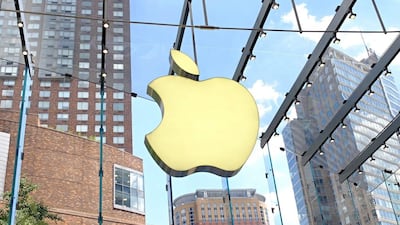No matter how you look at it, it’s hard to find a bright spot in Apple’s third-quarter earnings, announced this week.
Just about every important measure was down compared to a year ago. Revenue and per-share profit, the top-line results, were down 14 per cent and 23 per cent, respectively. Sales of the iPhone, the company’s bread and butter, dipped 21 per cent. Profit margin on the devices also fell 1.7 per cent.
Revenue from Apple’s key China market took a big hit, plummeting 32 per cent. Macintosh computer and iPad sales shrank 10 per cent and 8 per cent, respectively, while the company’s “other” category – which includes the Apple TV and Apple Watch – also dropped 15 per cent.
If there were any positives to be gleaned from the results, it’s that Apple’s services revenue – which includes the App Store, Apple Music, iCloud and Apple Pay – made a healthy 19 per cent jump to $6 billion.
In a conference call with analysts, Apple’s chief executive Tim Cook singled out that portion of the business, which now accounts for 14 per cent of the company’s revenue, as an engine of future growth.
Apple’s intent to make services a more important part of its business looks smart on the surface. The hardware that the company specialises in inevitably commoditises as competition ramps up, which means growth slows and profit margins shrink. It happened quickly to the iPad and the trend now has its teeth firmly in the iPhone.
But Apple isn’t the same company when it comes to services as it is with devices.
Its computers, tablets and phones are considered best-in-class – top-quality products that command high-end prices. Its services, not so much.
iCloud, Apple’s online storage locker, has been called its “worst” product. User forums are rife with complaints over syncing problems and how it is generally difficult to use. Alternatives such as Dropbox and Google Drive are seen as superior products. And, of course, there was that incident a few years ago where celebrities had their nude photos leaked after hackers got into their iCloud accounts.
Apple Music, the company's answer to Spotify, has also been roundly panned. Reviewers and users have been critical of its confusing interface, syncing problems and lack of features. A recent piece in The New Yorker summed it up succinctly by asking, "Why is Apple Music so bad when the iPhone is so good?"
In his call with investors this week, Mr Cook also hyped the growth of Apple Pay. The number of users was up 400 per cent in the quarter, while transaction volume on the mobile payments service was five times what it was a year ago, he said.
Independent analysis of Apple Pay, from which the company gets a small cut of each transaction, paints a different picture. A recent report from Market Platform Dynamics found that the number of iPhone users who routinely use Apple Pay has halved since its launch in late 2014.
According to those estimates, the install base may be growing as Apple Pay expands to additional countries, but users are finding it a forgettable experience after trying it out.
All of this together paints an intriguing picture of what Apple is going to look like in a few years. The company is in the process of converting from a seller of high-end, even luxury gadgets, to one that tries to get its revenue from ongoing online services, much like Netflix or Spotify does.
The problem is that the company has been peerless in devices, but its services have so far failed to achieve that same level of quality. When competitors’ products are significantly better, Apple is going to run the risk of running me-too services and it certainly won’t be able to command premium prices, as it does with hardware.
One other number of note from the company’s quarterly earnings – research and development spending jumped 27 per cent. Naturally, Apple isn’t saying what sorts of future products that money is going to, but a good chunk of it had better be for improving its online services.
If the company is to have a hope of making most of its money from such products rather than inevitably commoditising hardware, it’s going to have to make them substantially more appealing.
Peter Nowak is a veteran technology writer and the author of Humans 3.0: The Upgrading of the Species

